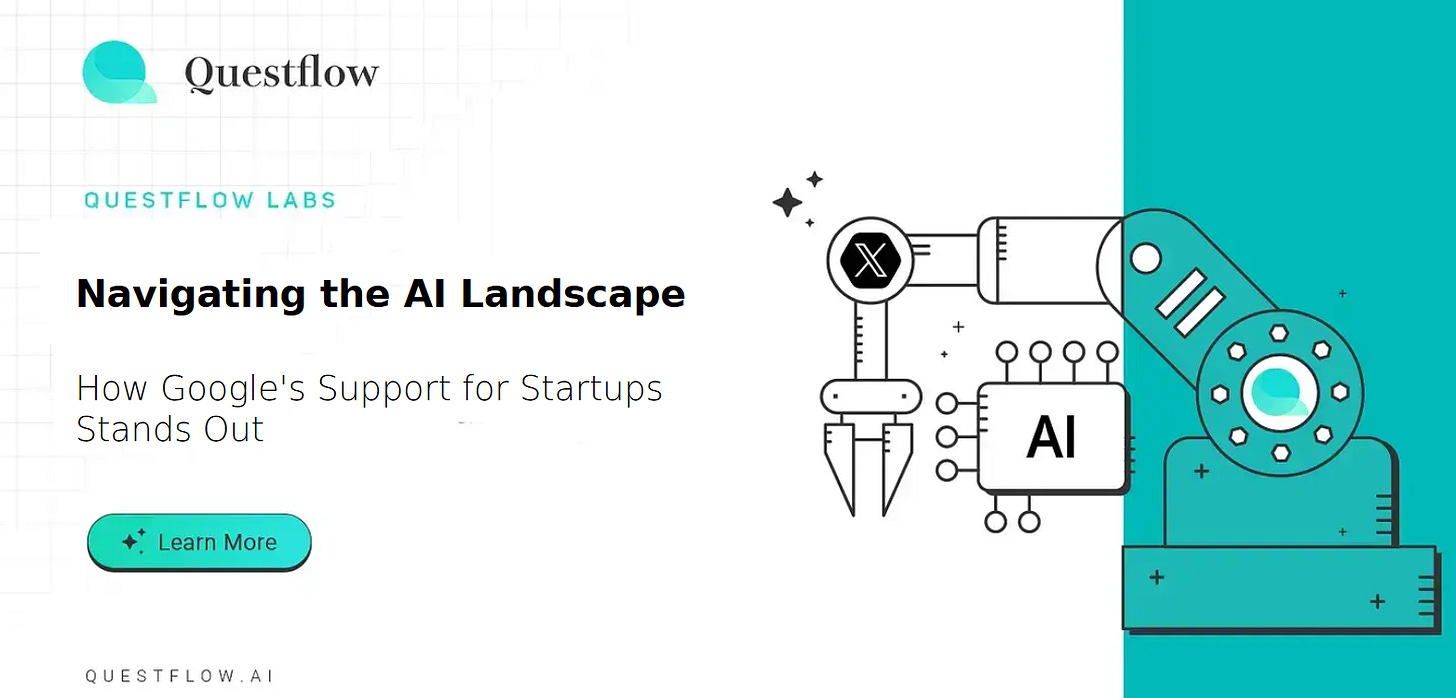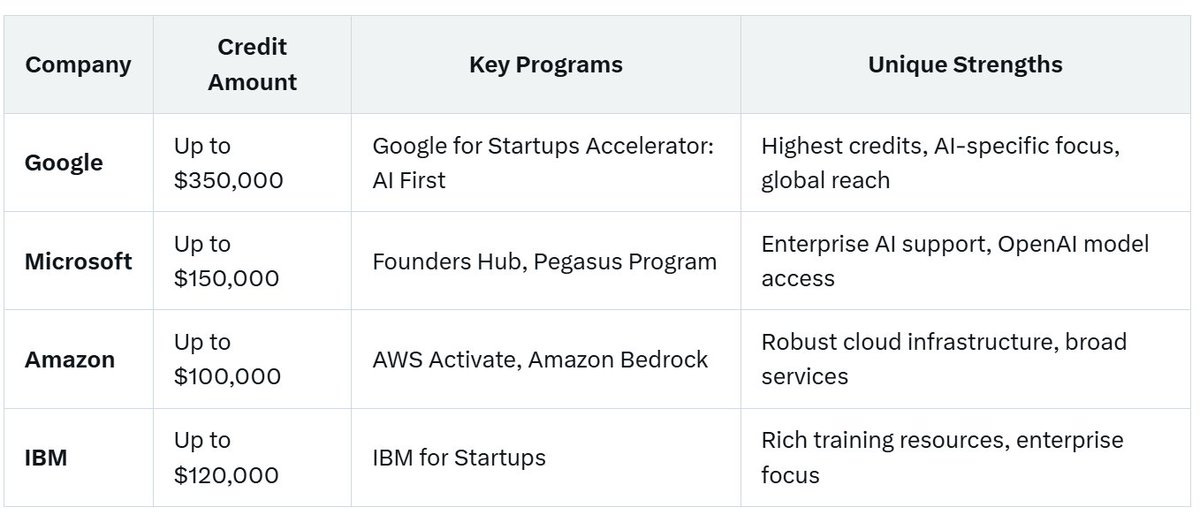Navigating the AI Landscape
How Google's Support for Startups Stands Out
Background: Questflow is rapidly iterating and has been in contact with major AI companies, especially Google. From our perspective, we’d like to share some insights for startups entering the AI space—helping you better understand Google’s AI strategy and how to collaborate with Google AI to accelerate your projects.
Introduction: The AI Revolution and Big Tech's Role
AI has swiftly moved from the realm of science fiction to a transformative force reshaping industries, economies, and everyday life. Whether it’s powering smarter search engines, revolutionizing healthcare diagnostics, or enabling personalized customer experiences, AI is at the heart of today’s technological evolution. Leading this charge are tech giants like Google, Microsoft, Amazon, and IBM, each investing billions to advance AI innovation. But their role extends beyond their own breakthroughs—they’re also nurturing the next generation of AI pioneers: startups.
In this article, I will explore Google’s AI strategy, with a spotlight on how they empower startups through initiatives like the "Google for Startups Accelerator: AI First" program. I will dive into the unique benefits Google offers, showcase real-world success stories, compare their approach with other major AI players, and provide actionable advice for startups navigating this competitive landscape. As a team already engaging with Google, I'm thrilled to share insights from our perspective, highlighting why their support stands out in the crowded AI ecosystem.
Google’s AI Strategy: Innovation, Integration, and Responsibility
Google’s approach to AI is a masterclass in balancing ambition with pragmatism. Their strategy rests on three foundational pillars: pushing the boundaries of innovation, seamlessly integrating AI into their products, and championing responsible development. Let’s break these down:
Innovation Through Research
Google has long been a trailblazer in AI research, with its @GoogleDeepMind division leading efforts to solve some of the field’s toughest challenges. DeepMind’s mission isn’t just about incremental improvements—it’s about pursuing Artificial General Intelligence (AGI), a hypothetical AI capable of performing any intellectual task a human can. In a 2025 blog post, DeepMind reiterated its commitment to a "responsible path to AGI," emphasizing safety, ethics, and risk mitigation as core priorities. This focus on cutting-edge research ensures Google remains at the forefront of AI’s evolution.
Integration into Core Products
For Google, AI isn’t a standalone project—it’s deeply embedded in their ecosystem. Take Google Search, for example. With the introduction of Gemini and AI Overviews, Search has become smarter and more intuitive, delivering concise, AI-generated answers to complex queries. By 2025, AI Overviews have reached over a billion users worldwide, a testament to Google’s ability to scale AI solutions. From YouTube recommendations to Google Maps navigation, AI enhances user experiences across their product suite, making it a cornerstone of their business.
Responsible AI Development
In an era where AI’s societal impact is under scrutiny, Google stands out for its commitment to ethics. Their AI Principles—established years ago—prioritize safety, privacy, and transparency. Whether it’s ensuring AI models don’t perpetuate bias or safeguarding user data, Google’s focus on responsible development builds trust and sets a standard for the industry.
While these efforts showcase Google’s leadership, their strategy isn’t just inward-facing. They’re equally dedicated to empowering others, especially startups, to harness AI’s potential. That’s where their startup support programs come into play.
Google’s Support for Startups: A Game-Changer for AI Innovators
For AI startups, the path to success is fraught with obstacles: high computing costs, limited access to expertise, and the challenge of scaling innovative ideas. Google recognizes these hurdles and has crafted a robust support system to help startups overcome them.
The "Google for Startups Accelerator: AI First" Program
The crown jewel of Google’s startup initiatives is the "Google for Startups Accelerator: AI First" program. Tailored specifically for AI-driven companies, this program offers a comprehensive package of resources designed to fuel growth. Here’s what participants gain:
Financial Support: Up to $350,000 in Google Cloud credits, spread over two years with a 20% discount in the second year. This is one of the most generous offerings among tech giants, providing startups with the financial runway to tackle compute-heavy AI workloads.
Technical Support: One-on-one access to Google’s engineers and industry experts, offering guidance on everything from model optimization to infrastructure scaling.
Mentorship and Training: Deep-dive workshops cover critical topics like product design, customer acquisition, leadership, and AI ethics—tailored to the unique needs of AI startups.
Networking Opportunities: Events like Demo Day connect startups with Google executives, investors, and potential partners, opening doors to collaboration and funding.
Global Reach: With programs in North America, Europe, India, Singapore, and beyond, Google ensures startups worldwide can tap into their resources.
This holistic approach goes beyond mere funding—it equips startups with the tools, knowledge, and connections with @googleaidevs they need to thrive in a competitive field.
Success Stories: Startups Thriving with Google’s Support
The true measure of Google’s impact lies in the startups they’ve propelled to success. Here are a few standout examples:
Beatovenai: This Indian startup uses AI to generate background music for audio-visual content. With Google’s cloud credits and mentorship, Beatoven scaled its platform and even provided AI-generated music for the 2024 Google I/O Connect event in Bengaluru. Their story highlights how Google’s support can turn a niche idea into a global showcase.
Vitraai: This startup aims to break language barriers for businesses with AI-powered translation tools. Leveraging Google’s resources, Vitra expanded its reach, proving the value of combining startup ingenuity with Google’s infrastructure.
Halloai: A communication-focused startup, Halloai saw a jaw-dropping 900% increase in B2B customers after joining Google’s accelerator. This explosive growth underscores the program’s ability to accelerate market traction.
These success stories illustrate how Google’s support isn’t just theoretical—it delivers tangible results, helping startups scale, innovate, and compete on a global stage.
How Google Compares to Other AI Giants
Google isn’t the only tech titan supporting AI startups. Microsoft, Amazon, and IBM also offer programs to nurture emerging companies. So, how does Google’s approach stack up? Let’s compare:
A Side-by-Side Comparison
Microsoft: Enterprise Powerhouse
Microsoft’s Founders Hub offers up to $150,000 in Azure credits, paired with access to OpenAI models (thanks to their partnership with OpenAI). Their Pegasus Program targets later-stage startups with enterprise AI needs. While powerful, their credit amount is less than half of Google’s, and their focus leans more toward established companies than early-stage AI innovators.
Amazon: Cloud Infrastructure Leader
Through AWS Activate, Amazon provides up to $100,000 in credits, bolstered by services like Amazon Bedrock for generative AI. Their strength lies in their unparalleled cloud infrastructure, but their support is less specialized for AI startups compared to Google’s tailored accelerator.
IBM: Training and Tradition
IBM for Startups offers up to $120,000 in cloud credits and emphasizes training via its Developer platform. It’s a solid choice for startups applying AI to traditional industries like finance or manufacturing, but it lacks the financial scale and AI-specific focus of Google’s program.
Why Google Stands Out
Google’s offering shines for three reasons:
Unmatched Financial Support: At $350,000, their cloud credits dwarf competitors’, giving startups more room to experiment and scale.
AI-First Focus: Unlike the broader support from Amazon or IBM, Google’s accelerator is laser-focused on AI, providing specialized resources and mentorship.
Global Ecosystem: With programs spanning multiple continents, Google fosters a diverse, worldwide community of AI innovators.
For AI startups needing substantial compute power and tailored guidance, Google’s program is a cut above the rest.
Choosing the Right Support: A Guide for Startups
With so many options, how can startups decide which tech giant’s support aligns with their goals? Here’s a practical guide:
Assess Your Needs: Need heavy compute power for AI training? Google’s $350,000 credits are ideal. Targeting enterprise clients? Microsoft’s OpenAI access might be better.
Align with Your Strategy: Building consumer-facing AI? Google’s product integration expertise is invaluable. Focused on cloud scalability? Amazon’s infrastructure excels.
Leverage Networking: Google’s Demo Day offers direct investor access, while Microsoft’s enterprise connections suit B2B startups.
Check Flexibility: Google’s two-year credit structure with discounts provides breathing room—ensure the program fits your timeline.
Learn from Peers: Study success stories. If startups like yours thrived with Google, it’s a strong signal.
Tips for Teams Engaging with Google
If you’re already in talks with Google (like us), maximize the opportunity:
Optimize Cloud Usage: Plan projects to fully utilize the $350,000 credits, prioritizing high-impact AI workloads.
Tap Mentorship: Seek Google experts for technical and scaling advice—they’re a goldmine of knowledge.
Network Strategically: Use events to pitch investors and partners who can accelerate your growth.
Conclusion: Google’s Unique Position in the AI Ecosystem
Google’s AI strategy is a powerful blend of innovation, integration, and responsibility—but it’s their commitment to startups that truly sets them apart. Through the "Google for Startups Accelerator: AI First" program, they’re not just advancing their own agenda; they’re building a vibrant ecosystem where new ideas can flourish.
Compared to Microsoft, Amazon, and IBM, Google’s generous credits, AI-specific focus, and global reach make it a standout choice for AI-first startups. Success stories like Beatovenai, Vitraai, and HalloAI prove their support delivers real results.
As we explore opportunities with Google ourselves, we’re excited to see how their resources can shape our journey—and the future of AI. For startups navigating this dynamic landscape, @GoogleAI offers not just a lifeline, but a launchpad to success.
Author : Tim @5B_Building
Join our community, contribute to development, or write your own AI Agent insights with us!



